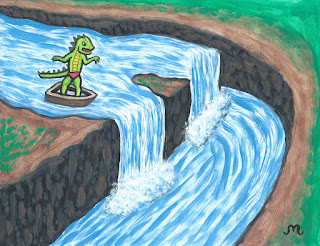Did Cavemen Start Their Day with a Healthy Breakfast?
Unless they came from the Flintstones, probably not. Even our ancestral hunter-gatherers who foraged for tens of thousands of years would not have started their day with a breakfast, let alone a healthy one.
The advent of agriculture, which reduced uncertainties in food supply and ended many of humanity’s nomadic lifestyles, probably kick-started the habit of eating breakfast. For the first time in history, food was readily available and there was a need for a daily burst of energy as people headed to the farms for a long day of work.
But the direct predecessor to the breakfast that we know and love today would not manifest itself until the Industrial Revolution around the 19th Century. As people migrated from farms to assembly lines, the practice of eating meals at structured breaks became the norm. Technological improvements ranging from refrigerators to microwaves would make it easier to plan meals in advance.
Then about a hundred years ago, women entered the workforce and breakfast became commercialized - just pop open a bag of store-brought cereal and canned pasteurized milk and you are good to go.
Of the three daily meals, none is given as much importance as breakfast. But what actually makes it special? Is it just a scheme for General Mills to sell sugary cereal and for McDonald’s to sell their breakfast sandwiches? Does it live up to the hype?
Every day, we fast for about 7 to 9 hours after dinner. When we sleep, the body consumes resources to recharge, rewire, and provide bounty of health benefits to both the brain and the body. Because of that, when we wake up in the morning, we are slightly undernourished and breakfast (break + fast) replenishes the much-needed energy and nutrients to the body.
Just don’t skip breakfast - that bagel and banana may be more important than you realize.
Sources:
https://sites.psu.edu/siowfa15/2015/10/21/breakfast-is-the-most-important-meal-of-the-day/
https://www.ahajournals.org/doi/full/10.1161/CIRCULATIONAHA.113.001474
https://www.nutritionletter.tufts.edu/issues/13_12/current-articles/Do-You-Really-Need-to-Eat-Breakfast-Every-Day_2267-1.html
https://www.nytimes.com/2017/08/21/well/eat/the-case-for-a-breakfast-feast.html?hpw=&%3Brref=health&%3Baction=click&%3Bpgtype=Homepage&%3Bmodule=well-region&%3Bregion=bottom-well&%3BWT.nav=bottom-well
https://newsroom.heart.org/news/meal-planning-timing-may-impact-heart-health
https://www.ncbi.nlm.nih.gov/pubmed/28701389
https://www.theguardian.com/lifeandstyle/2016/nov/28/breakfast-health-america-kellog-food-lifestyle
The advent of agriculture, which reduced uncertainties in food supply and ended many of humanity’s nomadic lifestyles, probably kick-started the habit of eating breakfast. For the first time in history, food was readily available and there was a need for a daily burst of energy as people headed to the farms for a long day of work.
But the direct predecessor to the breakfast that we know and love today would not manifest itself until the Industrial Revolution around the 19th Century. As people migrated from farms to assembly lines, the practice of eating meals at structured breaks became the norm. Technological improvements ranging from refrigerators to microwaves would make it easier to plan meals in advance.
Then about a hundred years ago, women entered the workforce and breakfast became commercialized - just pop open a bag of store-brought cereal and canned pasteurized milk and you are good to go.
Of the three daily meals, none is given as much importance as breakfast. But what actually makes it special? Is it just a scheme for General Mills to sell sugary cereal and for McDonald’s to sell their breakfast sandwiches? Does it live up to the hype?
Every day, we fast for about 7 to 9 hours after dinner. When we sleep, the body consumes resources to recharge, rewire, and provide bounty of health benefits to both the brain and the body. Because of that, when we wake up in the morning, we are slightly undernourished and breakfast (break + fast) replenishes the much-needed energy and nutrients to the body.
Just don’t skip breakfast - that bagel and banana may be more important than you realize.
Sources:
https://sites.psu.edu/siowfa15/2015/10/21/breakfast-is-the-most-important-meal-of-the-day/
https://www.ahajournals.org/doi/full/10.1161/CIRCULATIONAHA.113.001474
https://www.nutritionletter.tufts.edu/issues/13_12/current-articles/Do-You-Really-Need-to-Eat-Breakfast-Every-Day_2267-1.html
https://www.nytimes.com/2017/08/21/well/eat/the-case-for-a-breakfast-feast.html?hpw=&%3Brref=health&%3Baction=click&%3Bpgtype=Homepage&%3Bmodule=well-region&%3Bregion=bottom-well&%3BWT.nav=bottom-well
https://newsroom.heart.org/news/meal-planning-timing-may-impact-heart-health
https://www.ncbi.nlm.nih.gov/pubmed/28701389
https://www.theguardian.com/lifeandstyle/2016/nov/28/breakfast-health-america-kellog-food-lifestyle



Comments
Post a Comment